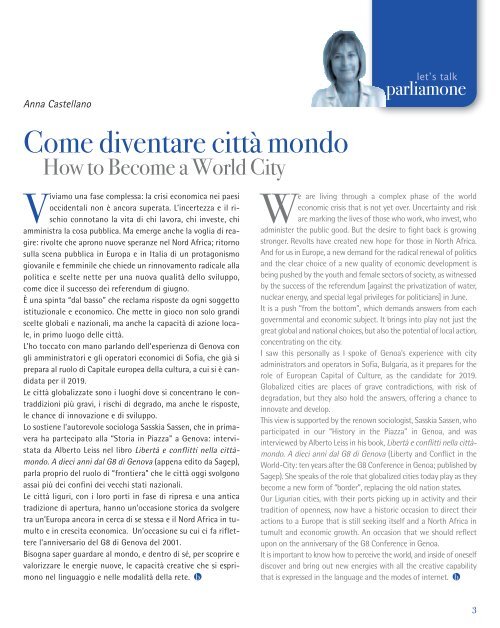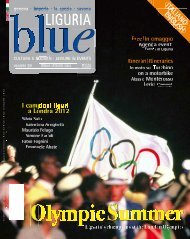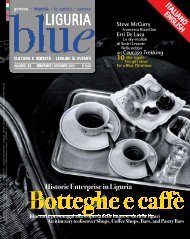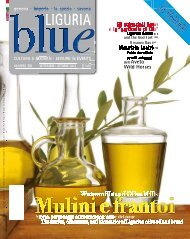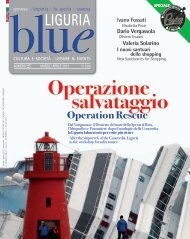Facciamoci sorprendere - Blue Liguria - Sagep
Facciamoci sorprendere - Blue Liguria - Sagep
Facciamoci sorprendere - Blue Liguria - Sagep
Create successful ePaper yourself
Turn your PDF publications into a flip-book with our unique Google optimized e-Paper software.
Anna Castellano<br />
Come diventare città mondo<br />
How to Become a World City<br />
Viviamo una fase complessa: la crisi economica nei paesi<br />
occidentali non è ancora superata. L’incertezza e il rischio<br />
connotano la vita di chi lavora, chi investe, chi<br />
amministra la cosa pubblica. Ma emerge anche la voglia di reagire:<br />
rivolte che aprono nuove speranze nel Nord Africa; ritorno<br />
sulla scena pubblica in Europa e in Italia di un protagonismo<br />
giovanile e femminile che chiede un rinnovamento radicale alla<br />
politica e scelte nette per una nuova qualità dello sviluppo,<br />
come dice il successo dei referendum di giugno.<br />
È una spinta “dal basso” che reclama risposte da ogni soggetto<br />
istituzionale e economico. Che mette in gioco non solo grandi<br />
scelte globali e nazionali, ma anche la capacità di azione locale,<br />
in primo luogo delle città.<br />
L’ho toccato con mano parlando dell’esperienza di Genova con<br />
gli amministratori e gli operatori economici di Sofia, che già si<br />
prepara al ruolo di Capitale europea della cultura, a cui si è candidata<br />
per il 2019.<br />
Le città globalizzate sono i luoghi dove si concentrano le contraddizioni<br />
più gravi, i rischi di degrado, ma anche le risposte,<br />
le chance di innovazione e di sviluppo.<br />
Lo sostiene l’autorevole sociologa Sasskia Sassen, che in primavera<br />
ha partecipato alla “Storia in Piazza” a Genova: intervistata<br />
da Alberto Leiss nel libro Libertà e conflitti nella cittàmondo.<br />
A dieci anni dal G8 di Genova (appena edito da <strong>Sagep</strong>),<br />
parla proprio del ruolo di “frontiera” che le città oggi svolgono<br />
assai più dei confini dei vecchi stati nazionali.<br />
Le città liguri, con i loro porti in fase di ripresa e una antica<br />
tradizione di apertura, hanno un’occasione storica da svolgere<br />
tra un’Europa ancora in cerca di se stessa e il Nord Africa in tumulto<br />
e in crescita economica. Un’occasione su cui ci fa riflettere<br />
l’anniversario del G8 di Genova del 2001.<br />
Bisogna saper guardare al mondo, e dentro di sé, per scoprire e<br />
valorizzare le energie nuove, le capacità creative che si esprimono<br />
nel linguaggio e nelle modalità della rete.<br />
let’s talk<br />
parliamone<br />
We are living through a complex phase of the world<br />
economic crisis that is not yet over. Uncertainty and risk<br />
are marking the lives of those who work, who invest, who<br />
administer the public good. But the desire to fight back is growing<br />
stronger. Revolts have created new hope for those in North Africa.<br />
And for us in Europe, a new demand for the radical renewal of politics<br />
and the clear choice of a new quality of economic development is<br />
being pushed by the youth and female sectors of society, as witnessed<br />
by the success of the referendum [against the privatization of water,<br />
nuclear energy, and special legal privileges for politicians] in June.<br />
It is a push “from the bottom”, which demands answers from each<br />
governmental and economic subject. It brings into play not just the<br />
great global and national choices, but also the potential of local action,<br />
concentrating on the city.<br />
I saw this personally as I spoke of Genoa’s experience with city<br />
administrators and operators in Sofia, Bulgaria, as it prepares for the<br />
role of European Capital of Culture, as the candidate for 2019.<br />
Globalized cities are places of grave contradictions, with risk of<br />
degradation, but they also hold the answers, offering a chance to<br />
innovate and develop.<br />
This view is supported by the renown sociologist, Sasskia Sassen, who<br />
participated in our “History in the Piazza” in Genoa, and was<br />
interviewed by Alberto Leiss in his book, Libertà e conflitti nella cittàmondo.<br />
A dieci anni dal G8 di Genova (Liberty and Conflict in the<br />
World-City: ten years after the G8 Conference in Genoa; published by<br />
<strong>Sagep</strong>). She speaks of the role that globalized cities today play as they<br />
become a new form of “border”, replacing the old nation states.<br />
Our <strong>Liguria</strong>n cities, with their ports picking up in activity and their<br />
tradition of openness, now have a historic occasion to direct their<br />
actions to a Europe that is still seeking itself and a North Africa in<br />
tumult and economic growth. An occasion that we should reflect<br />
upon on the anniversary of the G8 Conference in Genoa.<br />
It is important to know how to perceive the world, and inside of oneself<br />
discover and bring out new energies with all the creative capability<br />
that is expressed in the language and the modes of internet.<br />
3


